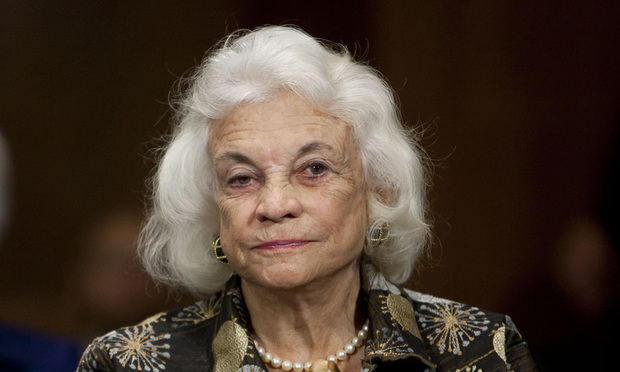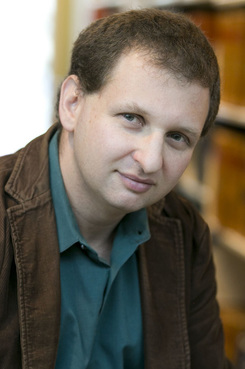Former O'Connor Clerk, Emory Law Professor Considers Justice's Role in the Middle
"Occasionally, she did go out of her way to find compromise solutions," said Sasha Volokh, who clerked for O'Connor in her last six months on the high court.
October 23, 2018 at 04:54 PM
3 minute read
 Retired Supreme Court Justice Sandra Day O'Connor (Photo: Diego M. Radzinschi/ALM)
Retired Supreme Court Justice Sandra Day O'Connor (Photo: Diego M. Radzinschi/ALM)
Tuesday's news that retired U.S. Supreme Court Justice Sandra Day O'Connor was retreating from public life after being diagnosed with early-stage dementia prompted many to consider her legacy on the high court.
Sasha Volokh, who teaches constitutional law at Emory University, clerked for O'Connor during her last six months on the court, ending in early 2006 when Justice Samuel Alito was confirmed as her replacement.
 Sasha Volokh, Emory University School of Law (Courtesy photo)
Sasha Volokh, Emory University School of Law (Courtesy photo)Twelve years later, he said, “Many of the important opinions I teach are O'Connor opinions.”
He said she will be remembered for “her ability to steer a middle course” between liberal and conservative factions.
She voted reliably with conservatives espousing “New Federalism,” which limited the power of the federal government. But she tended to side with the liberal wing of the court on due process matters, most notably forming a plurality opinion in 1992 upholding the right to abortion.
Her tests for deciding constitutional violations on affirmative action and the establishment clause made her vote unpredictable.
“Some people found it maddening,” Volokh said of O'Connor's middle road, which he suggested could have been informed by her background as a state legislator and judge in Arizona.
O'Connor didn't appear to set out to be a swing vote, but Volokh said, “Somebody's going to be the median” among nine jurists.
Appointed in 1981 by President Ronald Reagan, O'Connor was by definition a groundbreaker as the first woman on the high court.
Along with providing a key vote to preserve abortion rights, O'Connor wrote for the majority in a 5-4 decision holding that a Georgia girl could bring a Title IX lawsuit against her school district for not doing enough to stop a classmate who was sexually harassing her. Volokh cautioned against assuming O'Connor's gender played a significant role in her vote, noting the case was “about private rights of action.”
Asked about O'Connor's role on the court, Volokh said, “Occasionally, she did go out of her way to find compromise solutions.”
That tactic, he said, contrasted with that of the late Justice Antonin Scalia, who said what he thought, often bluntly in an off-putting manner.
Volokh said where Scalia may have been writing for law students and future scholars to adopt his philosophy of the law, O'Connor was asking, “What will make the law work today?”
A quirk in history meant that Volokh almost missed his chance to work for O'Connor, then regained it. Volokh was on a cross-country drive in summer 2005 to start his clerkship with her when he learned she had announced her retirement.
President George W. Bush tapped appellate lawyer John Roberts to replace O'Connor, but Chief Justice William Rehnquist died before Roberts could be confirmed. Bush then shifted Roberts to the chief's seat and asked O'Connor to stay on the court until her replacement could be confirmed.
That didn't occur until January 2006, when Alito joined the court. Volokh finished the term clerking for Alito.
This content has been archived. It is available through our partners, LexisNexis® and Bloomberg Law.
To view this content, please continue to their sites.
Not a Lexis Subscriber?
Subscribe Now
Not a Bloomberg Law Subscriber?
Subscribe Now
NOT FOR REPRINT
© 2025 ALM Global, LLC, All Rights Reserved. Request academic re-use from www.copyright.com. All other uses, submit a request to [email protected]. For more information visit Asset & Logo Licensing.
You Might Like
View All

Spalding Jurors Return $12M Verdict Against State Farm Insurance Client
10 minute readTrending Stories
Who Got The Work
J. Brugh Lower of Gibbons has entered an appearance for industrial equipment supplier Devco Corporation in a pending trademark infringement lawsuit. The suit, accusing the defendant of selling knock-off Graco products, was filed Dec. 18 in New Jersey District Court by Rivkin Radler on behalf of Graco Inc. and Graco Minnesota. The case, assigned to U.S. District Judge Zahid N. Quraishi, is 3:24-cv-11294, Graco Inc. et al v. Devco Corporation.
Who Got The Work
Rebecca Maller-Stein and Kent A. Yalowitz of Arnold & Porter Kaye Scholer have entered their appearances for Hanaco Venture Capital and its executives, Lior Prosor and David Frankel, in a pending securities lawsuit. The action, filed on Dec. 24 in New York Southern District Court by Zell, Aron & Co. on behalf of Goldeneye Advisors, accuses the defendants of negligently and fraudulently managing the plaintiff's $1 million investment. The case, assigned to U.S. District Judge Vernon S. Broderick, is 1:24-cv-09918, Goldeneye Advisors, LLC v. Hanaco Venture Capital, Ltd. et al.
Who Got The Work
Attorneys from A&O Shearman has stepped in as defense counsel for Toronto-Dominion Bank and other defendants in a pending securities class action. The suit, filed Dec. 11 in New York Southern District Court by Bleichmar Fonti & Auld, accuses the defendants of concealing the bank's 'pervasive' deficiencies in regards to its compliance with the Bank Secrecy Act and the quality of its anti-money laundering controls. The case, assigned to U.S. District Judge Arun Subramanian, is 1:24-cv-09445, Gonzalez v. The Toronto-Dominion Bank et al.
Who Got The Work
Crown Castle International, a Pennsylvania company providing shared communications infrastructure, has turned to Luke D. Wolf of Gordon Rees Scully Mansukhani to fend off a pending breach-of-contract lawsuit. The court action, filed Nov. 25 in Michigan Eastern District Court by Hooper Hathaway PC on behalf of The Town Residences LLC, accuses Crown Castle of failing to transfer approximately $30,000 in utility payments from T-Mobile in breach of a roof-top lease and assignment agreement. The case, assigned to U.S. District Judge Susan K. Declercq, is 2:24-cv-13131, The Town Residences LLC v. T-Mobile US, Inc. et al.
Who Got The Work
Wilfred P. Coronato and Daniel M. Schwartz of McCarter & English have stepped in as defense counsel to Electrolux Home Products Inc. in a pending product liability lawsuit. The court action, filed Nov. 26 in New York Eastern District Court by Poulos Lopiccolo PC and Nagel Rice LLP on behalf of David Stern, alleges that the defendant's refrigerators’ drawers and shelving repeatedly break and fall apart within months after purchase. The case, assigned to U.S. District Judge Joan M. Azrack, is 2:24-cv-08204, Stern v. Electrolux Home Products, Inc.








